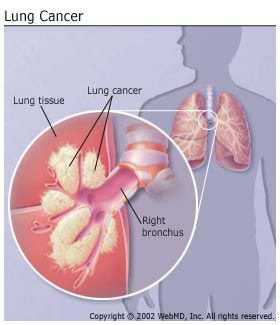 Ask Glen!
Ask Glen!Q.What Is Lung Cancer?
A. A tumor in the lungs
Although lung cancer is the leading cause of cancer death in the U.S. in both men and women, it is also one of the most preventable kinds of cancer. At least four out of five cases are associated with cigarette smoking, and the cause-and-effect relationship has been extensively documented. During the 1920s, large numbers of men began to smoke cigarettes, presumably in response to increased advertising. Twenty years later, the frequency of lung cancer in men climbed sharply. In the 1940s, significantly more women became smokers. Twenty years later, there was a similar dramatic increase in lung cancer among women.

Lung tumors almost always start in the spongy, pinkish gray walls of the bronchi -- the tubular, branching airways of the lungs. More than 20 types of malignant tumors that originate in the lung itself -- primary lung caner -- have been identified. The major types are small-cell lung cancer and non-small-cell lung cancer. The more common non-small variety is further divided into squamous cell carcinoma, adenocarcinoma, and large-cell carcinoma.
Non-Small Cell Lung Cancer
Squamous cell carcinoma usually starts in cells of the central bronchi, the largest branches of the bronchial tree. It is the most common type of lung cancer in men and in smokers; it is the easiest to detect early, since its distinctive cells are likely to show up in tests of mucus samples. It also tends to be most curable if found early because it spreads relatively slowly.
Adenocarcinoma is the most common type of lung cancer in women and nonsmokers -- tends to originate along the outer edges of the lungs in the smaller airways. Adenocarcinoma often spreads to spaces between the lungs and the chest wall, and its typical location makes early detection difficult.
Large-cell carcinomas are a group of cancers with large, abnormal-looking cells that tend to originate along the outer edges of the lungs. They are the least common of the non-small-cell lung cancers.
Small Cell Lung Cancer
Small-cell lung cancer is the most aggressive form of the disease; it is also called oat-cell cancer because, under a microscope, its cells resemble oat grains. Like squamous cell carcinoma, this cancer usually originates in the large, central bronchi. It spreads quickly, often before symptoms appear, making it particularly threatening. It frequently spreads (metastasizes) to the liver, bone, and brain. Although responsive to chemotherapy, small-cell lung cancer is rarely ever cured because it usually is not discovered before it has spread.
About 170,000 people in the U.S. are diagnosed with lung cancer each year, most between the ages of 40 and 70. Only 1% of lung cancer patients are younger than 30, and only 10% are older than 70. The number of people that survive five years or more is increasing and now stands at about 15%. An individual cancer sufferer's prognosis will vary according to the type of lung cancer involved, the person's overall health, and the status of the cancer at the time of diagnosis.
What Causes It?
Most lung cancer is caused by smoking and as with any cancer, each person's genetic pattern influences susceptibility. The fact that lung cancer runs in some families suggests that a predisposition can be inherited. Additionally, certain genetic traits have been identified that make some people more susceptible than others to cancer-causing substances like those found in tobacco smoke.
Nonetheless, anyone who smokes one pack of cigarettes daily is 20 times more likely than a nonsmoker to develop lung cancer. For people who smoke more than two packs a day, the risk more than triples. Breaking the smoking habit reduces risk significantly, yet former smokers are always slightly more susceptible than nonsmokers. Secondhand tobacco smoke can also cause lung cancer, giving nonsmokers who live or work with smokers a somewhat higher lung cancer risk than those in smoke-free environments.
Cancer-causing substances other than those found in tobacco or tobacco smoke can also cause lung cancer if inhaled in quantity over time. However, experts disagree about how much exposure to specific cancer-causing substances is dangerous. Workers who are exposed on a daily basis to asbestos, silica, mineral dusts, coal dust, arsenic, or the radioactive gas radon are much more likely than the average person to develop lung cancer, especially if they are smokers.
Lung tissue that has been scarred by disease or infection, such as scleroderma or tuberculosis, is more susceptible to tumor growth. Because of a high frequency of lung cancer among people who eat large amounts of fat and cholesterol, some researchers speculate that diet may also influence lung cancer risk.
Any personal health questions or problems mental or physical. Please consult your physician !
Wishing You Great Health!
Glen Edward Mitchell
Any questions? Ask Glen!




No comments:
Post a Comment